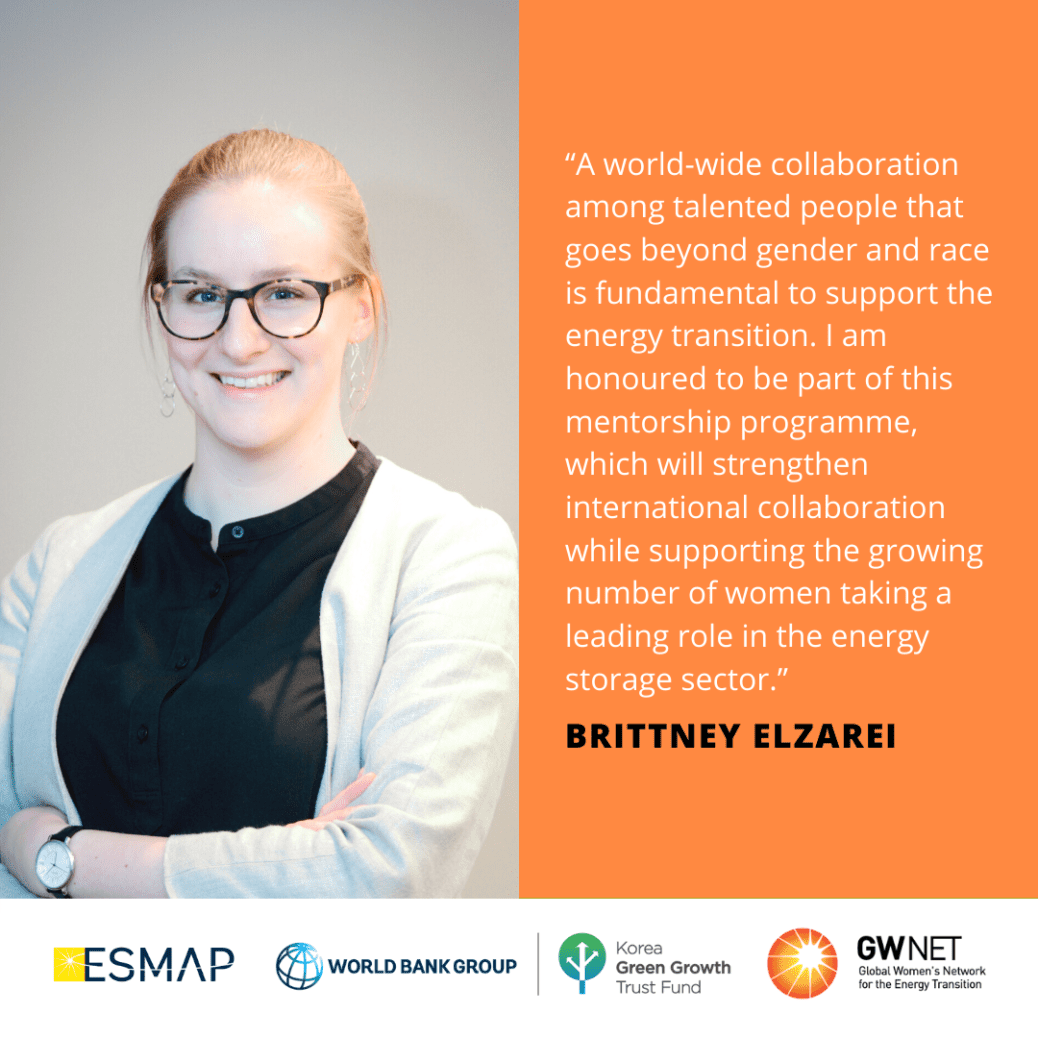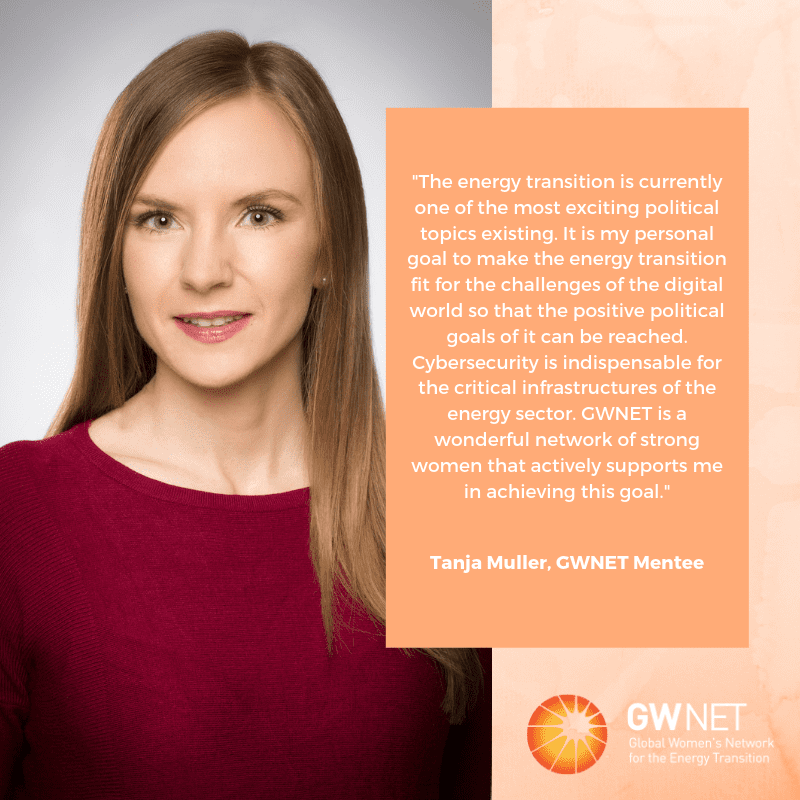The Women in Energy Storage Mentoring Programme sat down with Brittney Elzarei, one of this year’s mentors, to chat about her journey in renewable energy and the challenges and opportunities in the energy storage sector.
1. Tell us a little about yourself. What do you love most about what you do?
I have worked for almost five years now in the energy storage sector. As Policy Manager at the European Association for Storage of Energy (EASE), my mission is to support the roll-out of energy storage across Europe. I love the challenge of keeping up with the rapid technology and market developments in the sector while figuring out how to build a regulatory and policy framework that allows energy storage to reach its full potential. I never get bored at work and I never run out of things to do!
I also get to work with fantastic people – including the EASE team, the association’s members, policymakers, and other stakeholders in the Brussels energy sector. Of course, I am very happy to have the opportunity to play a role, however small, in supporting the clean energy transition.
2. What were your goals when you started working in energy storage? Have these evolved?
When I started working at EASE, I was completely new to energy storage. I had to learn all about the different energy storage technologies, their applications, business cases, and the regulatory and policy challenges, within the broader context of the energy transition. My initial goal was to learn as much as I could as quickly as possible in order to support the EASE members and further the mission of the association.
Almost five years later, I still have a lot to learn about the storage industry, so my goals there haven’t changed. Having taken on a management role within EASE, I focus increasingly on how to grow the role and influence of the association, improve our advocacy efforts, and improve the services we can offer to our members.
3. How have you adapted to the challenges caused by the COVID-19 pandemic and what advice would you give someone going through similar challenges?
2020 has been profoundly challenging, as the COVID-19 pandemic coincided with the birth of my first child. My daughter was born in January and when I returned to work in April I was adapting to working from home while revising the association’s advocacy and events planning for the year in light of the changing COVID-19 situation.
One piece of advice would be to consider opening up to colleagues and managers about the challenges related to work-life balance, especially in the COVID-19 era, where many of us lack a support network. As a new parent, it has been helpful to hear about others’ experiences. Showing vulnerability, while difficult, can help build stronger relationships with team members and contribute to a more family-friendly working environment.
4. What are the opportunities for energy storage growth in Europe?
As the EU has established the target of achieving a carbon-neutral energy system by 2050, there is a clear need for energy storage solutions to provide flexibility to the energy system, help integrate variable renewables, and support sector integration (linking the electricity, gas, heating and cooling, and transport sectors to maximise system-wide efficiencies).
Markets for storage are opening up around the EU as Member States implement the “Clean Energy for All Europeans” Package. Hundreds of billions of euros are being made available through the EU’s COVID-19 recovery plan “Next Generation EU”, a significant portion of which should be spent on clean energy technologies. So despite the crisis, there are many opportunities for storage across the EU.
5. What challenges have you faced in the sector? Can you tell us how you overcame (or are overcoming) this challenge(s)?
The energy storage sector – and indeed the broader energy sector – clearly has a gender balance problem, and the lack of female role models can be disappointing. Being one of the only female participants in a conference or networking event can feel awkward and dispiriting. Once I attended a networking dinner with around 40 participants, and I was one of only two women in the room! I never expected this to happen in Europe in the 21st century.
Making a change can be surprisingly difficult, though. At EASE we are struggling to improve the gender balance and diversity of speakers at our events by specifically seeking out female speakers and sharing with our members that we value diversity and gender balance. We are working to find creative ways to address this problem, but having resources such as GWNET and the Brussels Binder is a huge help.
On a personal level, the main challenge I’m facing at the moment is work-life balance, as I’m adjusting to life as a working parent while separated from my extended family due to the COVID-19 travel restrictions. My manager and team have been incredibly supportive, however, which makes all the difference in the world.
6. Why did you join the Women in Energy Storage Mentorship Programme? What do you hope to achieve?
I was excited about the launch of this programme as I am eager to connect with more women active in the energy storage sector and to support those starting out their careers. Programmes like this are incredibly important to encourage more women to enter the sector and achieve their ambitious goals.
In terms of achievements, I hope to create an open and safe space for discussion with my mentee, so that we can tackle any challenges she’s facing and help her develop valuable skills and experiences in the energy storage sector. I hope we will learn a great deal from each other and stay in touch long after the one-year mentorship programme ends.
7. What advice would you give to women hoping to join the energy storage sector?
Whether you’re interested in technologies, markets, or policy and regulation, it’s a great sector to be in. There are so many exciting developments happening in each of these areas so you will never stop learning and growing. Don’t be discouraged or intimidated if you show up at an event or meeting and are one of the only women in the room. Learning to be more assertive and confident, and overcoming some of our own biases, is incredibly important. We all have a role to play in building a more diverse and inclusive sector, so if you find yourself in a position to help others, pay it forward!
Become a mentor – what’s in it for you?
GWNET is looking for senior professionals who are eager to make a difference and have a positive impact on a younger woman’s career in the energy sector. With the ever-changing dynamics of the business fields, digitalisation, knowledge and knowledge sharing has become more important than ever. As a mentor, you get the opportunity to give something valuable back to more junior professionals and to expand your own knowledge through your mentees’ perspective. Mentoring will contribute to personal and professional development for both you and your mentee, as well as, shaping the direction of future generations within your field of expertise.
If you are interested in volunteering as a mentor in one of GWNET’s mentoring programmes (which involves approx. 1 – 1.5 hours of engagement per month plus optional participation in knowledge-transfer webinars), kindly fill-in the Mentor Datasheet.











